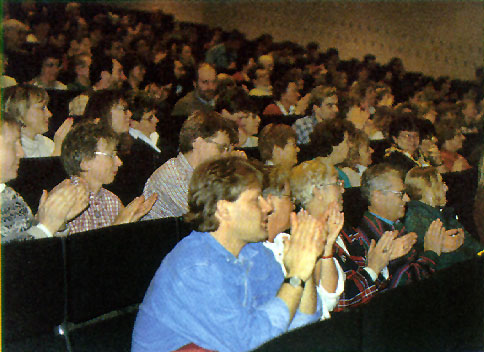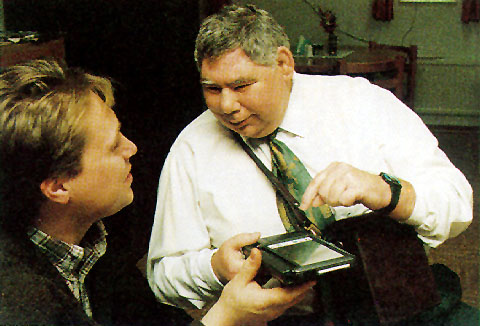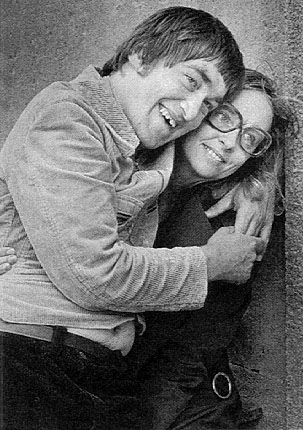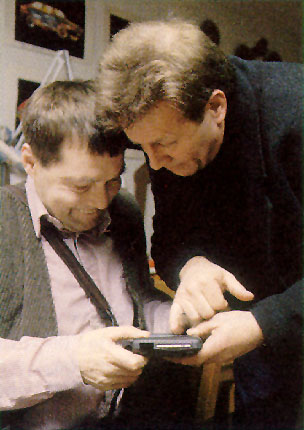
Gathering in the lecture hall of Lund University, the breaking up of the first part of the Isaac-project.
IT HAPPENS that you miss a word. The reasons could be different.
Maybe you have forgotten what a word, for example "Gedanken experiment", means. This is so easy to solve that you hardly call it a problem; you just look it up in a dictionary or ask a person who is nearby.
It is more difficult if you need an expression which no one yet has formulated. You could be forced to start in fog, travel in all directions in the landscape of thoughts, look for paths, maybe get lost. Maybe you will find what you are looking for, maybe not. The searching will undoubtedly make you more aware of what it was you were looking for.
When you finally have got yourself a word, for example, autism, you could start thinking about whether it is good or bad to have such a concept. Will it help the thought, sharpen your attention, make it possible to better exchange experiences, or will it separate and stigmatise.
It could also happen that you have a word that will not do. A word that circumscribes your imagination and makes it impossible to find important connections. A word that will lead imagination towards the wrong direction. A word that sometimes is unusable.
We claim that what you need is a new word, let us for the time being call it x, instead of a group of words, namely: mentally retarded, learning-disabled, mentally deficient, developmentally delayed, EMR (educable mentally retarded), TMR (trainable mentally retarded) etc., etc.
EXAMPLE
When the Isaac- project would show its final report in spring 1995 (about Isaac, see below) an invitation was written. An invitation that would tell the mentally retarded people ("the kids", "the pupils", "the participators") as well as the personnel and the relatives are welcome. The invitation was not very good; few people understood it and a lot of telephone conversations were needed to clarify that what we wanted was a mixed audience. It was also very good to think through how to act in front of a mixed audience with 300-400 people in it. Then there is no word such as "mentally retarded"- you will say something like "if you cannot read", "if you cannot find" etc. Maybe then there are no such words as "residents" or people called "the residentials"? Because you cannot call a human being's home"a resident" when she is present, can you? Or even worse, call her herself "a residential".

Gathering in the lecture hall of Lund University, the breaking up of the first part of the
Isaac-project.
In the American language there is a new word combination: differently abled. This is according to us a great progress, worth noticing and imitating. "Abled" not "disabled". And "differently abled": people have the right to be unique and different, and every single human being has the right to have an undulating ability profile.
A word shall reflect the age and its opinions. Today our culture does not want to dissociate itself from, or just store, mentally retarded people. Today we want them to be individuals with possibilities and rights, and we want to give them the support they need: pedagogy, music, art or technology.
We search for a word x, that will reflect this. The word x should draw the attention to the possibilities instead of the handicap and be in harmony with the pedagogical experiences which unambiguously shows us that you ought to start out from what a person can do, not from what she cannot. The word x should express the right to be unique without being an outsider. The word x should answer to abilities among people who stronger than anyone else are capable of arousing tenderness. Tenderness, which in itself is a positive feeling, is created by a positive meeting with someone you experience as real and unique. So it is not about searching for a word that will gloss over or change status. It is about a word that will make you think constructively, not staticly.
The already written text has led us to the inner acceptance of the word "differently abled ". It will be used consequently throughout the whole book- we have changed mentally retarded persons, learning disabilities etc. to differently abled people. Maybe you sometimes will be disturbed , and sometimes glad about it. Consider it an intellectual experiment, give it some time and feel if it affects you, if you can or want to take the word in your mouth. Do not let the word block your reading- we do not mean to be dogmatic, we just want to put your thoughts into action.
We know that the word "differently abled" is not widely spread, but we hope
it will be an alternative to " mentally retarded". With this word we want to,
above all, point at three aspects:
EXAMPLE
Ann- Britt had worked many years together with differently abled people. At first at a big institution, but now with a smaller group of people. She told us how it used to be when she sometimes met her fellow-workers at lunch. How they always made complaints about their "participators". Her fellow-workers knew (and she knew) that she was the one who had the toughest person and that she every day was exposed to the greatest physical and mental strain. But she never said anything negative about him, it did not seem right to do so.
Then one day she gave up and told the others. She told them about her everyday life: the hopelessness, the slaps, the spit, the fights. Then the lunch was over and she went back to work. To her horror she experienced that what she had said at lunch had dug in to her chest, and suddenly she found it difficult to like him, her most troublesome participator. The one she used to think of as her mission in life. Suddenly she looked at him the way she had told the others: the hopelessness, the slaps, the spit, the fights.
She decided never to say something like that again.

Today differently abled people are considered to have the right to develop their
independence and their personal integrity just like everybody else.
This book is about, and dedicated to those who are "differently abled", their relatives, personnel and other people who have contact with them. There exist today - among other things through the achievements in the field of technology- so many possibilities that it is probably your imagination that will constitute the limitation. To use the word "differently abled" could contribute to brake barriers of thoughts.

Stig yesterday

Stig today
In the book there are several examples of technology in its context. We hope that you will take to some of them with a smile or a laugh. A twelve year old boy said. "You see, when you have it like me, time runs very slow. But when you have got this teacher , then you are allowed to laugh. And making a laugh is just like taking a bath. You will get rid of the dirt. It is like cutting the time of. Then it is much easier to live."
Above there are some pictures of Stig Nilsson . Stig has his smile and his laugh. Maybe this has helped him to wash off unpleasantness. Now when Stig has been a proud Isaac-user, he learns something new everyday, something he can show real joy about. It will be very exciting to see how much Stig is able to learn about communication with help from Isaac. Maybe his laugh will show us.
The key-words and the key-thoughts of the chapter"Differently abled"- a word that will lead your thoughts in a direction towards genuine respect for a fellow-creature and towards a constructive curiosity on her hidden abilities. The attention is on what she can do, not on what she cannot. We want to show how technology can help a person who is "differently abled", reveal his needs and dreams. To make the possibilities visible it is important that the environment look at her as a person who is differently abled and do not act as a deputy thinker. We want to remove the barrier of thoughts that now prevent possible technology from being used in special schools. You have the right to be unique without being put aside. You have the right to have a halting ability profile. "To make a laugh is just like taking a bath." |
Next chapter: Documentation , or back to Table of Contents.